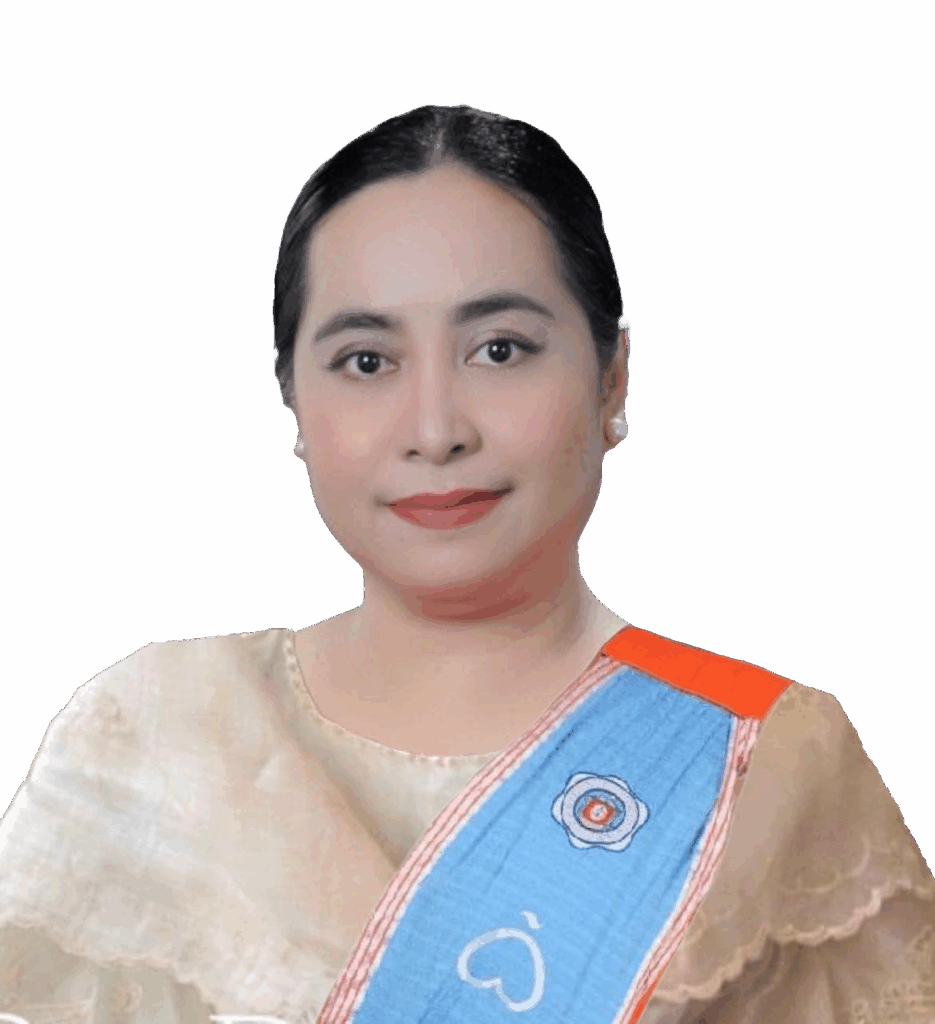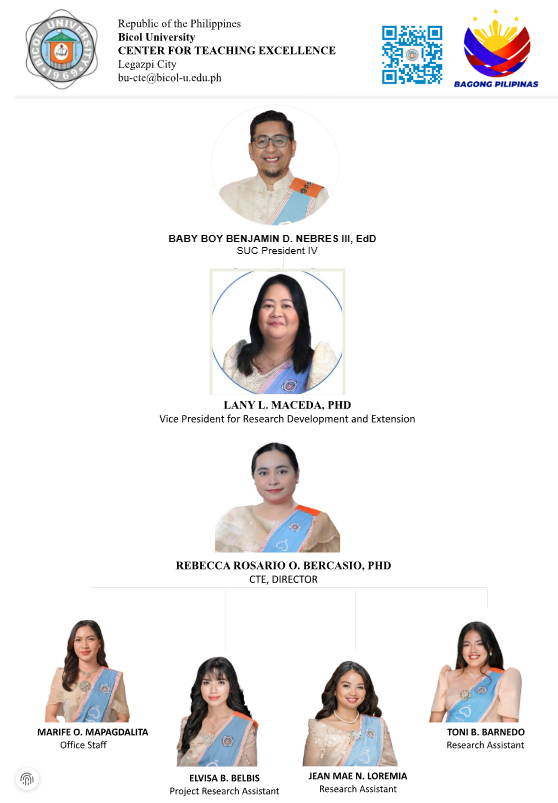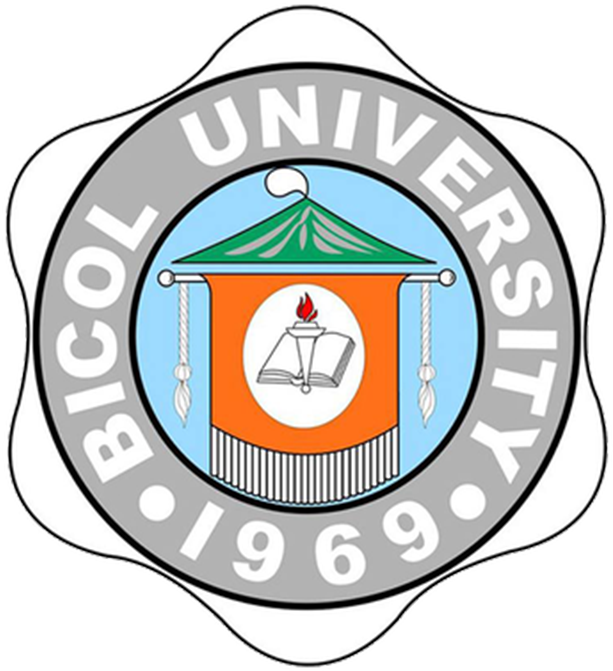
Center for Teaching Excellence
REBECCA ROSARIO O. BERCASIO, PhD
CTE Director
ANNOUNCEMENTS
The RDESys Integrated Databank System is now live! Experience the future of data management. The Call for BU-Funded Research and Development Proposals is now open until May 15, 2025 . Submit through the RDESys-ProMIS: Proposal Management Information System. Click Submit Now!
About Us
The Bicol University Center for Teaching Excellence (BUCTE) stands as a dynamic academic hub committed to advancing quality, innovative, and transformative teaching practices across the university and the Bicol Region. Academic institutions, as pillars of societal development, bear the critical responsibility of nurturing human potential to ensure that the values and achievements of civilization are preserved and enhanced for generations to come. In line with this mandate, BUCTE champions high standards of instruction that respond to the evolving demands of education in a context shaped by Diversity, Volatility, Uncertainty, Complexity, Ambiguity, and Disruption (D-VUCAD).
As a leading institution in Southern Luzon, Bicol University envisions becoming a world-class university. The Center for Teaching Excellence plays a pivotal role in achieving this vision by supporting the academic growth of faculty members through responsive, research-based, outcomes-driven, and technology-enhanced instructional practices. It recognizes the need to institutionalize professional development efforts to continuously build a critical mass of educators who are equipped to meet the challenges of global education and 21st-century learning.
BUCTE upholds the University’s core values of scholarship, leadership, service, and character. It promotes the scholarship of teaching and adheres to the highest ethical standards in all its functions. Through ongoing education, research, and extension initiatives, the Center fosters lifelong learning and ensures that both local and international trends in pedagogy are meaningfully incorporated into its programs and services. It also actively supports innovation in educational policies and practices, aiming to elevate teaching quality at all levels.
To fulfill its mission, the Center offers quality professional development programs for Bicol University faculty and educators throughout the region. It also facilitates collaborative research, provides academic support for teacher education students, and cultivates faculty learning communities. Through local and global partnerships, the BUCTE serves as a catalyst for instructional excellence—empowering educators to become agents of transformative education in their institutions and communities.
Functions
Offer quality professional development programs/projects and services to Bicol University faculty as well as to educators and teachers in the Bicol Region.
Conduct and/or assist in the conduct of researches or initiatives which aim to inform, improve and innovate the teaching and learning practices.
Provide alternative academic support to students across levels and disciplines, and to students in Teacher Education Programs both in the undergraduate and graduate levels along research and instructional practices in collaboration with the Graduate School and the College of Education.
Work collaboratively with the relevant centers and offices in the University in offering blended learning programs to both faculty and Teacher Education students
Engage in partnership with colleges or units of the University in order to establish faculty learning communities to strengthen sharing of good practices
Promote excellence in teaching through scholarly undertakings in Bicol University and beyond through trainings, seminars or conferences with local and international partners
Vision and Mission
Vision Statement
A Center for Teaching Excellence that promotes innovative instructional practices.
Mission Statement
The Center seeks to advance responsive, research-based, technology-enhanced, and outcomes-based teaching and learning practices.
Sections
The Center shall have the following sections and their corresponding functions:
Records Management Section (RMS)
2.3.1.1. Receive all incoming communications, memoranda, administrative orders and others whether in print version or thru email
2.3.1.2. Coordinate with Central Records (OVPRDE) for incoming and outgoing communication CTE
2.3.1.3. Monitor and prepare documentation of CTE engagements with teachers, students and external clients such as but not limited to research, meetings, conferences, trainings and others
2.3.1.4. Check, validate and systematically record office transactions for organization and reference of the Center
2.3.1.5. Forward and follow-up referrals and requests from different units, colleges, divisions, centers or clients
2.3.1.6. Release all reports, recommendations, endorsements and referrals of the section through the Director and/or of the CTE Director
2.3.1.7. Prepare communications such as letters, memoranda, routing slip, inventory of supplies, pool of experts affiliated to the Center and others emanating from the CTE Director.
Lifelong Learning Management Section (LLMS)
2.3.2.1. Provide academic support to students in the undergraduate or graduate level through academic dialogue, consultation and mentoring
2.3.2.2. Prepare proposal for capacity building necessary for students’ holistic development
2.3.2.3. Prepare proposal aimed at improving pedagogical competence of the faculty
2.3.2.4. Implement approved activity/project for students and faculty development
2.3.2.5. Assist the Center in all its research, development and extension undertakings
2.3.2.6. Coordinate with concerned offices/divisions/centers/units in the implementation /conduct of the Centers’ project/activities
2.3.2.7. Prepare documentation, and reports of all the activities/projects related to capacity-building of students, teachers and other clients
2.3.2.8. Prepare recommendations and responses to queries of other offices/divisions/centers/units and clients pertaining to the Lifelong Management Learning
2.3.2.9. Perform other functions that may be assigned from time to time
Linkages and Extension Section (LES)
2.3.3.1. Prepare and revise extension program proposal and other pertinent documents
2.3.3.2. Implement approved extension programs, projects or activities (PPAs) in collaboration with internal and external partners
2.3.3.3. Prepare reports and documentation of extension PPAs for submission to concerned offices/divisions/centers/units
2.3.3.4. Present status and updates on extension PPAs in regular meeting, review, and other similar fora
2.3.3.5. Coordinate with internal and external partners/divisions during the preparation and implementation of extension PPAs
2.3.3.6. Prepare recommendations and response to queries of other offices and clients pertaining to the Linkages and extension
2.3.3.7. Perform other function that may be assigned from time to time
Research and Development Section (RDS)
2.3.4.1. Prepare and revise research and development proposals and other pertinent documents
2.3.4.2. Implement approved research PPAs in collaboration with internal and external partners
2.3.4.3. Prepare reports and documentation for research PPAs for submission to concerned offices
2.3.4.4. Present status and updates on research PPAs in regular meeting, review and similar fora
2.3.4.5. Coordinate with internal and external partners/divisions during the preparation and implementation of research PPAs
2.3.4.6. Facilitate and/or initiate curriculum development and curriculum innovation through research-based undertakings
2.3.4.7. Prepare recommendation and response to queries of clients or concerned pertaining to research and development
Organizational Chart

Programs and Projects
EXTENSION PROGRAMS AND PROJECTS
Teaching Enhancement Program
The Teaching Enhancement Program (TEP) is a comprehensive range of programs which aims to enrich, inform and improve the instructional competence of BU faculty. This program uses various strategies of engaging faculty on various issues, trends, practices and initiatives on pedagogy and research activities on teaching and learning in a context characterized by D-VUCA. Over-all, this program aims to:With Local Government Units (LGU), Department of Health Regional Office V (DOH V), Partner Non-Government Organization (NGO)
Encourage faculty to be abreast with the relevant and updated knowledge in pedagogy and pedagogical attributes of the new normal;
-
Encourage faculty to be abreast with the relevant and updated knowledge in pedagogy and pedagogical attributes of the new normal;
-
Enhance knowledge and skills in the implementation of flexible learning, blended learning, remote or ubiquitous learning;
-
Enhance strategies and techniques in teaching and managing learning in conventional or flipped classrooms;
-
Promote sharing of good instructional practices among faculty; and
- Foster the faculty’s commitment to continually enhance one’s teaching practices through responsive academic innovations.
The CTE-TEP may include but is not limited to the following activities and services: 1) Pedagogy Seminar-Workshops, 2) Faculty Mentoring Program, 3) Faculty Induction Program, 4) Faculty Innovation in Teaching (FIT) Program, 5) Teacher-in-Residence Program, 6) Teaching Demonstration Festival (Teaching Demofest), 6) Blended Continuing Learning for Teachers, and 7) Travel Grant on Education.
Graduate Teacher Education Support Program
The Graduate Teacher Education Support Program (CTE-GTES Program) aims to upgrade the Teacher Education Programs in the graduate level through various research activities intended to enhance the research capabilities of the students. In coordination with the Graduate School, College of Education, and concerned program official/coordinator, the Center will conduct supplementary activities which can further support the students as they are about to conduct or are conducting the research as requirements for academic courses or as requirement for the degree program. The GTES may include, but is not limited to the following: 1) Seminar Series on Education Research (SSER), 2) Education Research Colloquium (ERC), 3) Research Consultations (GTE-RC), and 4) Research Training Series for Teachers (RTST).
Academic Support towards Enhanced Learning
The Academic Support towards Enhanced Learning (ASEL) Program is a support system to students of Bicol University intended to enhance their learning specifically along the identified BU Institutional Learning Outcomes. The services and activities under this program aim to assist the advanced students to further cultivate academic excellence, and to assist the challenged or at-risk students to cope with varied academic challenges and/or acquire other enabling skills so they will be able to improve their academic performance.
Alternative Support toward Excellence in Pre-service Teaching
The Alternative Support toward Excellence in Pre-service Teaching (ASEPT) Program is a comprehensive support mechanism intended to enhance the pedagogical competence and to address the challenges encountered by the at-risk students in various professional and content courses. The activities intended for the advanced learners aim to cultivate excellence in pedagogy among the students even at the pre-service stage. The activities intended for the challenged or at-risk students aim to minimize difficulties of students in various professional courses, content courses or other enabling skills/areas so they will be able to improve their academic standing, avoid academic deficiencies or deal with the demands of pre-service teaching.
ASEPT Program shall include but is not limited to the following: 1) Student Mentoring, 2) Pre-service Education Seminar-Workshops (PES), 3) Institutional Peer Academic Assistance Program (I-PASS), 4) Reading Program for Pre-service Teachers, 5) Learning Strategies Consultation Sessions (LSCS), and 6) Individual and Small Group Tutorials.
Other Programs
The Center shall initiate other programs deemed necessary, relevant and significant to address the changing needs and challenges of the different groups of clients considering recent trends and developments in education.
Key Program Concerns
The Bicol University Extension function covers five areas of concern. These five areas makes up the key components in operationalizing this function. These are the following:
Teaching Enhancement Program – The Teaching Enhancement Program (TEP) is a comprehensive range of programs which aims to enrich, inform and improve the instructional competence of BU faculty. This program uses various strategies of engaging faculty on various issues, trends, practices and initiatives on pedagogy and research activities on teaching and learning in a context characterized by D- VUCA. Over-all, this program aims to:
-
- Encourage faculty to be abreast with the relevant and updated knowledge in pedagogy and pedagogical attributes of the new normal;
- Enhance knowledge and skills in the implementation of flexible learning, blended learning, remote or ubiquitous learning;
- Enhance strategies and techniques in teaching and managing learning in conventional or flipped classrooms;
- Promote sharing of good instructional practices among faculty; and
- Foster the faculty’s commitment to continually enhance one’s teaching practices through responsive academic innovations.
The CTE-TEP may include but is not limited to the following activities and services:
-
- Pedagogy Seminar-Workshops
- Faculty Mentoring Program
- Faculty Induction Program
- Faculty Innovation in Teaching (FIT) Program
- Teacher-in-Residence Program
- Blended Continuing Learning for Teachers
- Travel Grant on Education.
Alternative Support toward Excellence in Pre-service Teaching – The Alternative Support toward Excellence in Pre-service Teaching (ASEPT) Program is a comprehensive support mechanism intended to enhance the pedagogical competence and to address the challenges encountered by the at-risk students in various professional and content courses. The activities intended for the advanced learners aim to cultivate excellence in pedagogy among the students even at the pre- service stage. The activities intended for the challenged or at-risk students aim to minimize difficulties of students in various professional courses, content courses or other enabling skills/areas so they will be able to improve their academic standing, avoid academic deficiencies or deal with the demands of pre-service teaching. ASEPT Program shall include but is not limited to the following:
-
- Student Mentoring
- Pre-service Education Seminar Workshops (PES)
- Institutional Peer Academic Assistance Program (I-PASS)
- Reading Program for Pre-service Teachers
- Learning Strategies Consultation Sessions (LSCS)
- Individual and Small Group Tutorials.
Graduate Teacher Education Support Program – The Graduate Teacher Education Support Program (CTE-GTES Program) aims to upgrade the Teacher Education Programs in the graduate level through various research activities intended to enhance the research capabilities of the students. In coordination with the Graduate School, College of Education, and concerned program official/coordinator, the Center will conduct supplementary activities which can further support the students as they are about to conduct or are conducting the research as requirements for academic courses or as requirements for the degree program. The GTES may include, but is not limited to the following:
-
- Seminar Series on Education
Research (SSER) - Education Research Colloquium (ERC)
- Research Consultations (GTE-RC)
- Research Training Series for Teachers (RTST).
- Seminar Series on Education
Knowledge Management – this is for the generation, retrieval, storage of knowledge and constitute the information system of the Center as a repository of vital science and technology which can improve the delivery of extension services to the clientele in terms of access and utilization.
Development and Action Research – This component is concerned with undertaking development and action research projects with the aim of generating and innovating approaches and methodologies for extension to answer the needs of communities. It also includes built in monitoring and evaluation schemes to ensure the smooth, effective and efficient implementation of the programs and projects as the University led undertaking or being pursued in partnership with other development agencies and institution both local and international. It also includes verification, pilot–testing, commercialization, adoption and utilization of acceptable or matured research outputs to a locality where appropriate and applicable or inputs to extension.
The key components concretizes the University’s goal of “ Scholarship engagement for the community for sustainable development “ as it attains the sectoral and societal of “ Humnan development towards poverty reduction and sustainable development” as shown in the Figure below.
The Extension Logic Model is also shown to show clear cut outputs and outcomes that it aims to attain as it considers the condition of the community it serves and the factors that could affect its function.
Resources
*coming soon*
Reports
*coming soon*
Contact Us

Higher Education Regional Research Center, Legazpi City, Albay

bu-cte@bicol-u.edu.ph

BU CTE

Office Hours:
Monday – Friday: 8:00 a.m. – 5:00 p.m.
Saturday – Sunday: Closed
About Us
The Bicol University Center for Teaching Excellence (BUCTE) stands as a dynamic academic hub committed to advancing quality, innovative, and transformative teaching practices across the university and the Bicol Region. Academic institutions, as pillars of societal development, bear the critical responsibility of nurturing human potential to ensure that the values and achievements of civilization are preserved and enhanced for generations to come. In line with this mandate, BUCTE champions high standards of instruction that respond to the evolving demands of education in a context shaped by Diversity, Volatility, Uncertainty, Complexity, Ambiguity, and Disruption (D-VUCAD).
As a leading institution in Southern Luzon, Bicol University envisions becoming a world-class university. The Center for Teaching Excellence plays a pivotal role in achieving this vision by supporting the academic growth of faculty members through responsive, research-based, outcomes-driven, and technology-enhanced instructional practices. It recognizes the need to institutionalize professional development efforts to continuously build a critical mass of educators who are equipped to meet the challenges of global education and 21st-century learning.
BUCTE upholds the University’s core values of scholarship, leadership, service, and character. It promotes the scholarship of teaching and adheres to the highest ethical standards in all its functions. Through ongoing education, research, and extension initiatives, the Center fosters lifelong learning and ensures that both local and international trends in pedagogy are meaningfully incorporated into its programs and services. It also actively supports innovation in educational policies and practices, aiming to elevate teaching quality at all levels.
To fulfill its mission, the Center offers quality professional development programs for Bicol University faculty and educators throughout the region. It also facilitates collaborative research, provides academic support for teacher education students, and cultivates faculty learning communities. Through local and global partnerships, the BUCTE serves as a catalyst for instructional excellence—empowering educators to become agents of transformative education in their institutions and communities.
Functions
Offer quality professional development programs/projects and services to Bicol University faculty as well as to educators and teachers in the Bicol Region.
Conduct and/or assist in the conduct of researches or initiatives which aim to inform, improve and innovate the teaching and learning practices.
Provide alternative academic support to students across levels and disciplines, and to students in Teacher Education Programs both in the undergraduate and graduate levels along research and instructional practices in collaboration with the Graduate School and the College of Education.
Work collaboratively with the relevant centers and offices in the University in offering blended learning programs to both faculty and Teacher Education students
Engage in partnership with colleges or units of the University in order to establish faculty learning communities to strengthen sharing of good practices
Promote excellence in teaching through scholarly undertakings in Bicol University and beyond through trainings, seminars or conferences with local and international partners
Vision and Mission
Vision Statement
A Center for Teaching Excellence that promotes innovative instructional practices.
Mission Statement
The Center seeks to advance responsive, research-based, technology-enhanced, and outcomes-based teaching and learning practices.
Sections
The Center shall have the following sections and their corresponding functions:
Records Management Section (RMS)
2.3.1.1. Receive all incoming communications, memoranda, administrative orders and others whether in print version or thru email
2.3.1.2. Coordinate with Central Records (OVPRDE) for incoming and outgoing communication CTE
2.3.1.3. Monitor and prepare documentation of CTE engagements with teachers, students and external clients such as but not limited to research, meetings, conferences, trainings and others
2.3.1.4. Check, validate and systematically record office transactions for organization and reference of the Center
2.3.1.5. Forward and follow-up referrals and requests from different units, colleges, divisions, centers or clients
2.3.1.6. Release all reports, recommendations, endorsements and referrals of the section through the Director and/or of the CTE Director
2.3.1.7. Prepare communications such as letters, memoranda, routing slip, inventory of supplies, pool of experts affiliated to the Center and others emanating from the CTE Director.
Lifelong Learning Management Section (LLMS)
2.3.2.1. Provide academic support to students in the undergraduate or graduate level through academic dialogue, consultation and mentoring
2.3.2.2. Prepare proposal for capacity building necessary for students’ holistic development
2.3.2.3. Prepare proposal aimed at improving pedagogical competence of the faculty
2.3.2.4. Implement approved activity/project for students and faculty development
2.3.2.5. Assist the Center in all its research, development and extension undertakings
2.3.2.6. Coordinate with concerned offices/divisions/centers/units in the implementation /conduct of the Centers’ project/activities
2.3.2.7. Prepare documentation, and reports of all the activities/projects related to capacity-building of students, teachers and other clients
2.3.2.8. Prepare recommendations and responses to queries of other offices/divisions/centers/units and clients pertaining to the Lifelong Management Learning
2.3.2.9. Perform other functions that may be assigned from time to time
Linkages and Extension Section (LES)
2.3.3.1. Prepare and revise extension program proposal and other pertinent documents
2.3.3.2. Implement approved extension programs, projects or activities (PPAs) in collaboration with internal and external partners
2.3.3.3. Prepare reports and documentation of extension PPAs for submission to concerned offices/divisions/centers/units
2.3.3.4. Present status and updates on extension PPAs in regular meeting, review, and other similar fora
2.3.3.5. Coordinate with internal and external partners/divisions during the preparation and implementation of extension PPAs
2.3.3.6. Prepare recommendations and response to queries of other offices and clients pertaining to the Linkages and extension
2.3.3.7. Perform other function that may be assigned from time to time
Research and Development Section (RDS)
2.3.4.1. Prepare and revise research and development proposals and other pertinent documents
2.3.4.2. Implement approved research PPAs in collaboration with internal and external partners
2.3.4.3. Prepare reports and documentation for research PPAs for submission to concerned offices
2.3.4.4. Present status and updates on research PPAs in regular meeting, review and similar fora
2.3.4.5. Coordinate with internal and external partners/divisions during the preparation and implementation of research PPAs
2.3.4.6. Facilitate and/or initiate curriculum development and curriculum innovation through research-based undertakings
2.3.4.7. Prepare recommendation and response to queries of clients or concerned pertaining to research and development
Organizational Chart

Programs and Projects
EXTENSION PROGRAMS AND PROJECTS
Teaching Enhancement Program
The Teaching Enhancement Program (TEP) is a comprehensive range of programs which aims to enrich, inform and improve the instructional competence of BU faculty. This program uses various strategies of engaging faculty on various issues, trends, practices and initiatives on pedagogy and research activities on teaching and learning in a context characterized by D-VUCA. Over-all, this program aims to:With Local Government Units (LGU), Department of Health Regional Office V (DOH V), Partner Non-Government Organization (NGO)
Encourage faculty to be abreast with the relevant and updated knowledge in pedagogy and pedagogical attributes of the new normal;
-
Encourage faculty to be abreast with the relevant and updated knowledge in pedagogy and pedagogical attributes of the new normal;
-
Enhance knowledge and skills in the implementation of flexible learning, blended learning, remote or ubiquitous learning;
-
Enhance strategies and techniques in teaching and managing learning in conventional or flipped classrooms;
-
Promote sharing of good instructional practices among faculty; and
- Foster the faculty’s commitment to continually enhance one’s teaching practices through responsive academic innovations.
The CTE-TEP may include but is not limited to the following activities and services: 1) Pedagogy Seminar-Workshops, 2) Faculty Mentoring Program, 3) Faculty Induction Program, 4) Faculty Innovation in Teaching (FIT) Program, 5) Teacher-in-Residence Program, 6) Teaching Demonstration Festival (Teaching Demofest), 6) Blended Continuing Learning for Teachers, and 7) Travel Grant on Education.
Graduate Teacher Education Support Program
The Graduate Teacher Education Support Program (CTE-GTES Program) aims to upgrade the Teacher Education Programs in the graduate level through various research activities intended to enhance the research capabilities of the students. In coordination with the Graduate School, College of Education, and concerned program official/coordinator, the Center will conduct supplementary activities which can further support the students as they are about to conduct or are conducting the research as requirements for academic courses or as requirement for the degree program. The GTES may include, but is not limited to the following: 1) Seminar Series on Education Research (SSER), 2) Education Research Colloquium (ERC), 3) Research Consultations (GTE-RC), and 4) Research Training Series for Teachers (RTST).
Academic Support towards Enhanced Learning
The Academic Support towards Enhanced Learning (ASEL) Program is a support system to students of Bicol University intended to enhance their learning specifically along the identified BU Institutional Learning Outcomes. The services and activities under this program aim to assist the advanced students to further cultivate academic excellence, and to assist the challenged or at-risk students to cope with varied academic challenges and/or acquire other enabling skills so they will be able to improve their academic performance.
Alternative Support toward Excellence in Pre-service Teaching
The Alternative Support toward Excellence in Pre-service Teaching (ASEPT) Program is a comprehensive support mechanism intended to enhance the pedagogical competence and to address the challenges encountered by the at-risk students in various professional and content courses. The activities intended for the advanced learners aim to cultivate excellence in pedagogy among the students even at the pre-service stage. The activities intended for the challenged or at-risk students aim to minimize difficulties of students in various professional courses, content courses or other enabling skills/areas so they will be able to improve their academic standing, avoid academic deficiencies or deal with the demands of pre-service teaching.
ASEPT Program shall include but is not limited to the following: 1) Student Mentoring, 2) Pre-service Education Seminar-Workshops (PES), 3) Institutional Peer Academic Assistance Program (I-PASS), 4) Reading Program for Pre-service Teachers, 5) Learning Strategies Consultation Sessions (LSCS), and 6) Individual and Small Group Tutorials.
Other Programs
The Center shall initiate other programs deemed necessary, relevant and significant to address the changing needs and challenges of the different groups of clients considering recent trends and developments in education.
Key Program Concerns
The Bicol University Extension function covers five areas of concern. These five areas makes up the key components in operationalizing this function. These are the following:
Teaching Enhancement Program – The Teaching Enhancement Program (TEP) is a comprehensive range of programs which aims to enrich, inform and improve the instructional competence of BU faculty. This program uses various strategies of engaging faculty on various issues, trends, practices and initiatives on pedagogy and research activities on teaching and learning in a context characterized by D- VUCA. Over-all, this program aims to:
-
- Encourage faculty to be abreast with the relevant and updated knowledge in pedagogy and pedagogical attributes of the new normal;
- Enhance knowledge and skills in the implementation of flexible learning, blended learning, remote or ubiquitous learning;
- Enhance strategies and techniques in teaching and managing learning in conventional or flipped classrooms;
- Promote sharing of good instructional practices among faculty; and
- Foster the faculty’s commitment to continually enhance one’s teaching practices through responsive academic innovations.
The CTE-TEP may include but is not limited to the following activities and services:
-
- Pedagogy Seminar-Workshops
- Faculty Mentoring Program
- Faculty Induction Program
- Faculty Innovation in Teaching (FIT) Program
- Teacher-in-Residence Program
- Blended Continuing Learning for Teachers
- Travel Grant on Education.
Alternative Support toward Excellence in Pre-service Teaching – The Alternative Support toward Excellence in Pre-service Teaching (ASEPT) Program is a comprehensive support mechanism intended to enhance the pedagogical competence and to address the challenges encountered by the at-risk students in various professional and content courses. The activities intended for the advanced learners aim to cultivate excellence in pedagogy among the students even at the pre- service stage. The activities intended for the challenged or at-risk students aim to minimize difficulties of students in various professional courses, content courses or other enabling skills/areas so they will be able to improve their academic standing, avoid academic deficiencies or deal with the demands of pre-service teaching. ASEPT Program shall include but is not limited to the following:
-
- Student Mentoring
- Pre-service Education Seminar Workshops (PES)
- Institutional Peer Academic Assistance Program (I-PASS)
- Reading Program for Pre-service Teachers
- Learning Strategies Consultation Sessions (LSCS)
- Individual and Small Group Tutorials.
Graduate Teacher Education Support Program – The Graduate Teacher Education Support Program (CTE-GTES Program) aims to upgrade the Teacher Education Programs in the graduate level through various research activities intended to enhance the research capabilities of the students. In coordination with the Graduate School, College of Education, and concerned program official/coordinator, the Center will conduct supplementary activities which can further support the students as they are about to conduct or are conducting the research as requirements for academic courses or as requirements for the degree program. The GTES may include, but is not limited to the following:
-
- Seminar Series on Education
Research (SSER) - Education Research Colloquium (ERC)
- Research Consultations (GTE-RC)
- Research Training Series for Teachers (RTST).
- Seminar Series on Education
Knowledge Management – this is for the generation, retrieval, storage of knowledge and constitute the information system of the Center as a repository of vital science and technology which can improve the delivery of extension services to the clientele in terms of access and utilization.
Development and Action Research – This component is concerned with undertaking development and action research projects with the aim of generating and innovating approaches and methodologies for extension to answer the needs of communities. It also includes built in monitoring and evaluation schemes to ensure the smooth, effective and efficient implementation of the programs and projects as the University led undertaking or being pursued in partnership with other development agencies and institution both local and international. It also includes verification, pilot–testing, commercialization, adoption and utilization of acceptable or matured research outputs to a locality where appropriate and applicable or inputs to extension.
The key components concretizes the University’s goal of “ Scholarship engagement for the community for sustainable development “ as it attains the sectoral and societal of “ Humnan development towards poverty reduction and sustainable development” as shown in the Figure below.
The Extension Logic Model is also shown to show clear cut outputs and outcomes that it aims to attain as it considers the condition of the community it serves and the factors that could affect its function.
Resources
*coming soon*
Reports
*coming soon*
Contact Us

Higher Education Regional Research Center, Legazpi City, Albay

bu-cte@bicol-u.edu.ph

BU CTE

Office Hours:
Monday – Friday: 8:00 a.m. – 5:00 p.m.
Saturday – Sunday: Closed
